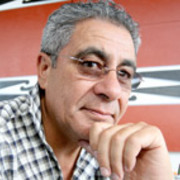
Derek Fox
One of New Zealand's leading Māori broadcasters, Derek Fox has been a journalist, commentator, politician and publisher. A native speaker of Māori, he is one of a small number of journalists who provide a Māori viewpoint both in Māori media and the mainstream. Prime Minister Helen Clark described him in 2002 as the "pre-eminent Māori broadcaster of his generation".
Fox was born in Wairoa, the town he would return to in the mid-90s as mayor. He was raised by his grandparents on the isolated eastern tip of the Mahia peninsula, south-east of Gisborne. Their farm was accessible only by horseback, or by an army vehicle at low tide.
Fox learnt te reo Māori from his grandparents, before returning to his parents around the age of five or six. His formal schooling was at Ngata Memorial College in Ruatoria, then at St Stephen's School on the edge of Auckland.
Fox's first year at Auckland University sparked an interest in broadcasting, and he moved to Wellington's Victoria University. He launched a career with the NZ Broadcasting Corporation, including time as a reporter at Gisborne's Radio 2ZG, and moved into television in the early 1970s.
Fox has worked off-and-on for TVNZ throughout much of his career, including presenting and reporting on programmes including Koha, Kaleidoscope and Marae. In 1983 he and fellow screen taonga Whai Ngata set up Te Karere, the daily Māori news programme that continues today. Fox presented and reported on Te Karere until he left TVNZ in 1986. In the years since then he has returned frequently, usually to present Marae.
In the 70s he was also instrumental in setting up Te Reo o Aotearoa, a radio unit for both Māori and Pacific broadcasters, which he did during a secondment from television. Fox was part of a group that battled for almost two decades to force the Crown to establish Māori radio and television, to nurture and protect te reo Māori. It began with a claim to the Waitangi Tribunal in 1984 involving te reo and including broadcasting. In the decade of litigation that followed, Fox balanced his support for the Māori broadcasting cause with his work within the broadcasting industry.
In 1992 Fox launched the long-running Mana magazine, and Rotorua-based Mana Māori News. He also became the chair of the Māori Broadcasters Association, which was later renamed Ngā Aho Whakaari. There are few Māori in the industry who share his breadth and depth of experience across print, radio and television, and he has often been the ‘go to' man for mainstream media seeking an opinion on matters Māori.
In the 1990s Fox contributed to the panel discussion on TV3's The Ralston Group, and he would later appear on panel discussions for Backch@t, Native Affairs, and Eye to Eye with Willie Jackson. Fox's ability to reasonably present Māori views on contentious issues remains one of his strengths. He has the ability to communicate the essence of complex issues in plain language that can be easily understood. His warm, rich voice and telegenic looks help to deliver the message, however unpalatable his views may be to some.
With this background it was perhaps inevitable that Fox would look to represent his people in government. He unsuccessfully stood for Parliament as an independent in 1999, and again in 2008 for the Māori Party, which he had co-founded in 2000. His political aspirations had been controversially put on hold in 2001, when he was appointed chairman of the Māori Television Service. Opposition MPs at the time argued this appointment was a move by the Labour government to remove Fox as a political threat in the Māori seats.
Fox was instrumental in setting up the Māori Television Service, serving as chair of the first MTS board (the birth of the channel, which went to air in March 2004, is chronicled in documentary Tātau Tātou, and in the April 2009 issue of Mana). His vision for the channel, together with the MTS board, guided the early set-up phase of the channel. But the run was not entirely smooth. Prior to the channel's launch the Canadian Chief Executive of Māori Television, John Davy, was exposed and sacked for faking his CV, and Fox had to make an about face from attacking the media for "Maori-bashing" to admitting there was truth in the allegations against Davy. Fox then took over as Chief Executive. The appointment lasted only six months before Fox resigned, over a human resources issue with a colleague.
Fox then returned to his political aspirations, and his work with the Māori Party. He unsuccessfully contested the Ikaroa-Rawhiti seat against former Labour Māori Affairs Minister (and Fox's own relative) Parekura Horomia, losing by 1609 votes. Fox's most recent appointment was as Press Secretary to Māori Party co-leader Tariana Turia. In that role he contributed to Māori Party speeches, press releases and to its website.
Fox won controversy after the 2015 killings at Paris publication Charlie Hedbo, when he argued that editor Stephane Charbonnier had "paid the price for his arrogance" in thinking he could insult another people's culture with impunity.
Sources include
Warren Gamble, 'Profile: Derek Fox, Maori Television chairman' - The NZ Herald, 4 May 2002
Anne Lu, 'Charlie Hebdo Shooting: Maori Broadcaster Derek Fox Under Fire For Victim-Blaming Comments on Paris Terror Attacks' International Business Times website. Loaded 9 January 2015. Accessed 15 January 2015
'RIGHT AROUND', Gisborne Photo News No 191, 20 May 1970